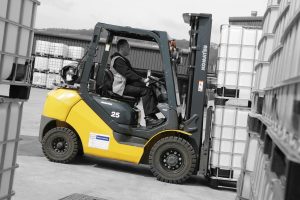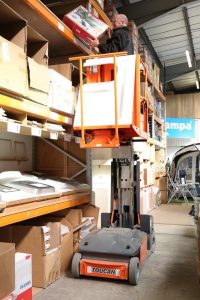Siemens’ £160m wind turbine factory in Hull has brought significant investment in the wind energy sector to the region. Does it signal the beginning of the end for fossil fuels? And what does it mean for the logistics industry?
It is now completely ordinary to see panels on your neighbours’ roof soaking up solar energy, just as we are getting used to looking out to sea and seeing a wind farm on the horizon. This is likely to be due, in part, to high profile figures making pledges to use more renewable energy sources and encouraging the population to follow suit.
Many big brands have recently been promising that by 2025, 100% of purchased electricity will come from renewable sources. Giant beer producer, Anheuser-Busch InBev, has said that in eight years your cold Budweiser, Stella Artois or Corona will be made with renewable energy, such as wind or solar power.
By doing so they will reduce their carbon footprint by 30% – equivalent to removing 500,000 cars from the road! Coca Cola and IKEA are among the other companies pledging to go 100% renewable.
Hydrogen fuel cells
While businesses across the globe are being urged to reduce their usage of fossil fuels and look for alternative ways of using energy, the closest the materials handling industry has come to a green source of energy is the use of hydrogen fuel cells to power forklifts.
It was recently announced that South Africa are to make more hydrogen fuel cell forklifts in a bid to use clean energy, but although there’s a lot of hydrogen on the surface of the planet, most of it exists in chemical compounds such as crude oil and water. This means that in order to produce enough to power the world’s vehicles, hydrogen fuel cells need to be produced industrially, a process that means as much as 95% of hydrogen would be produced by burning fossil fuels. Still, there a number of not-so-popular methods that could be the future of renewable energy to help power forklifts as well as the rest of the globe.
Best Foot Forward
Piezoelectricity is a method of producing energy from pressure. Pioneering companies such as PaveGen are using this concept in floor tiles, so that people walking around or dancing produce enough electricity to run the shopping centre or nightclub they are in. Each PaveGen floor tile is equipped with a wireless API that transmits real-time movement data analytics, whilst directly producing power when and where it is needed. As pedestrians walk across the system, the weight from their footsteps causes generators to vertically displace, resulting in the radial motion creating energy through electro-magnetic induction. A nightclub in Rotterdam is making use of this technology too, but electric dance moves don’t come cheap, the club’s 270-square-foot floor cost around $257,000!
this concept in floor tiles, so that people walking around or dancing produce enough electricity to run the shopping centre or nightclub they are in. Each PaveGen floor tile is equipped with a wireless API that transmits real-time movement data analytics, whilst directly producing power when and where it is needed. As pedestrians walk across the system, the weight from their footsteps causes generators to vertically displace, resulting in the radial motion creating energy through electro-magnetic induction. A nightclub in Rotterdam is making use of this technology too, but electric dance moves don’t come cheap, the club’s 270-square-foot floor cost around $257,000!
Body Heat
Stockholm’s Central Station is making use of those sweaty rush hours and conserving body heat to warm an office block not far from the station. The Central Station’s ventilation system is fitted with heat exchangers, allowing the excess body heat to be converted to hot water before being pushed into the building’s heating system. As well as being a green renewable energy source, the system has lowered the energy bill by as much as 25% for the office block.
Nevertheless, it has been said that the system works well in Sweden due to their cold winters, and the cost and benefits can depend on the climate as well as the price of energy.
Transistor Breakthough
Scientists at the University of Cambridge have recently discovered a new transistor design that could mean ultra-low power applications such as wearable devices and implantable electronics no longer need to be powered by batteries.
The new design uses a similar method to a computer in sleep mode, using a tiny ‘leak’of electrical current to function. Compared to water dripping from a faulty tap, the current is formed from contact between the metal and semiconducting components of a transistor, a characteristic that engineers usually try to avoid. Although transistors have had this ability for years, this is the first time the current has been effectively captured and used practically.
Drawing energy from an AA battery based on this design, it has been said, would make it last for a billion years.
Methane Cow Backpacks
According to the UN, 18% of the total release of greenhouse gases is down to agriculture, and cattle are a big contributor to this number. Methane is 23 times more harmful to the environment than CO2, and one cow releases 70 to 120 kgs of methane on average per year. With 1.5 billion of them around the globe, that’s a lot of harmful greenhouse gas. Researchers in Argentina have developed a backpack that collects the cow methane, purifying and compressing it for use in generating electricity.
Try not to get too excited though, while it might sound like ‘cowpower’ is the newest form of renewable energy, it’s still just in the concept stage.
What it all means for MHE…
The piezoelectricity and body heat concepts may not be ideal to power materials handling equipment, but if busy facilities started to harvest the energy from pressure and warmth produced by the employees, it’s possible businesses could be saving money while protecting the planet from green-house gases in the future.
 It is somewhat unlikely we’ll see the next generation of forklift trucks being powered by tiny electrical current leaks or cow emissions. What we can say is that the direction of travel appears to be well established, if not for the planet’s sake, then for cost, health and security of energy supply reasons. What’s more the renewable energy activities in Hull together with these new discoveries pave the way for new research projects that might one day provide a green source of energy powerful enough to fuel forklifts and distribution centres worldwide. In the meantime, Windsor Hull can offer advice on equipment with low emissions and other energy-saving benefits.
It is somewhat unlikely we’ll see the next generation of forklift trucks being powered by tiny electrical current leaks or cow emissions. What we can say is that the direction of travel appears to be well established, if not for the planet’s sake, then for cost, health and security of energy supply reasons. What’s more the renewable energy activities in Hull together with these new discoveries pave the way for new research projects that might one day provide a green source of energy powerful enough to fuel forklifts and distribution centres worldwide. In the meantime, Windsor Hull can offer advice on equipment with low emissions and other energy-saving benefits.
[Featured image credit: www.siemens.com/press]
It’s now been a year since Windsor opened a dedicated forklift training centre, and our east coast counterparts have seen significant take up of the wide range of courses on offer at the Immingham-based facility.
But it’s not just businesses located a stones-throw away from the Cleethorpes seafront that can take advantage of our training courses. In fact, it’s better if you aren’t. Leave it up to our skilled instructors to travel the length of Lincolnshire and come to you instead!
Here at the Sleaford branch of Windsor, we think training undertaken on customer sites has a variety of benefits…
Ever nailed a speech in front of your other half at home, but suddenly develop stage-fright when doing it for real? Well the same can be said for forklift training. If trainees are comfortable in their surroundings, they are much more likely to learn quicker, resulting in more efficient use of machinery when the course is complete.
We might provide training on a wide range of machinery, including counterbalance, reach trucks, powered pallet trucks (PPT), rough terrain, scissor lifts and boom trucks – but it is difficult to replicate the exact equipment, stock and space available for every customer in a training centre environment. Using specific equipment that will be used for the work at the end of the training means employees will come out of their training fully ready to take on the task at hand.
Having training courses take place on site can also mean management can keep an eye on the progress their employee is making. This can be especially useful when the trainee is a new employee. Finding out how quickly your new starters grasp things can be priceless to successfully running an efficient operation.
Our training centre in Immingham can offer dual accreditation from the industry recognised Road Transport Industry Training Board (RTITB) and Independent Training Standards Scheme and Register (ITSSAR), but teaching multiple trainees a different set of house safety rules would make things really complex for our training staff. If, however, our instructors are based on your site throughout the training course, your specific safety policies will be followed from the start, meaning productivity is maintained while health and safety issues are prevented too.
Another benefit of bringing training courses to the actual workplace is the opportunity for trainees to start interacting with personnel they will be working with during actual operations. Relationships are an important factor in running an efficient operation, and this interaction is better off not delayed.
Training on-site also provides an opportunity for trainees to pick up skills and knowledge from senior employees. When new employees finish the course and finally get their ticket to ride (a forklift), they are already acquainted with the operation and are much more likely to adapt to the workflow faster.
…and letting our experienced training instructors bring the knowledge to you!
After almost nine years since the original model was launched on the market, a Komatsu forklift is still being recognised by leading industry awards in the heavy equipment sector.
Since its launch, the IC engine-powered BX50 Series forklift has seen frequent updates, and is a particular favourite of Windsor Materials Handling customers due to their robust performance and great features. Now, the series has been awarded with the honour of Highest Retained Value from EquipmentWatch – a leading database for the US heavy equipment industry.
EquipmentWatch benchmarks the long-term performance of machines across a host of categories, looking for those that retained the highest residual value over the past five years of data.
Over 12,500 models from a valuation database were considered by analysts, which were then narrowed down to 156 series from 36 brands. The Komatsu beat five other finalists, including Doosan’s Pro5 Series.
Windsor customers have been choosing forklifts from the award-winning BX series for many years, with several unique industry leading features as the main selling point.
The dual floating structure greatly reduces vibration, protecting both the operator and critical components of the truck. An EZ-Lift tandem pump hydraulic system enables increased efficiency and improved truck control in tight spaces.
A directional flow counterweight also allows hot air and engine exhaust fumes to be pushed down and away from the operator’s compartment – especially important while driving in reverse.
The BX50 joins two other Komatsu machines, the GD655 Motor Grader and the WA320 Wheel Loader, as award winners in their respective categories.
“The award is indicative of excellence across a manufacturing organization,” said Garrett Schemmel, Vice President of EquipmentWatch. “Product quality has the most obvious impact on an asset’s performance on the secondary market, but residual values are also highly impacted by brand affinity and fair original pricing. A manufacturer must excel on all three fronts to be the winner.”
A supplier of caravan and motorhome parts based in Grimsby has reached new heights with a helping hand from the Immingham branch of Windsor Materials Handling.
Established in Grimsby in 1992, Magnum Motorhomes & Caravan Supplies is a family run business specialising in building materials and accessories for caravans and motorhomes. Operating from a facility working as both a warehouse and a customer-facing retail environment, the business needed a new way to retrieve stock from the high racking.
Previously using ladders to access the out of reach and bulky items, Magnum managing director, Ken Carter approached Windsor Materials Handling for advice on the best form of equipment to serve the busy wholesaler-style shop.
“With up to ten customers browsing the aisles at once, Magnum needed a compact solution to ensure optimum safety and space to walk around,” said Windsor sales manager Steve Austin. “After taking multiple factors into consideration, I recommended a JLG Toucan Duo vertical mast lift.”
The compact dimensions and low stowed height of the Toucan Duo allow access to confined space areas, while the six-metre working height, 130kg platform capacity and great turning circle make it ideal for the application at Magnum Motorhomes.
“When Steve first recommended the Toucan Duo, we were sceptical because it was only available brand new, but when we trialled the piece of equipment we knew it would have to stay,” said Magnum managing director, Ken Carter. “We reallocated a few of our stock locations to ensure it had a clear path to all the high racking. The machine has revolutionised our day-to-day operation, it’s extremely rare we ever get the ladders out now!”
Magnum was founded when Ken Carter, after years of building caravans for Abbey Caravans, decided to begin  building his own motorhomes and selling surplus caravan parts. Since then, the business has manufactured all types of conversions, from coach-built to panel vans, race units and even a 52-seater coach. More recently, Magnum has become well-known for being one of the UK’s largest stockists of building materials and accessories for caravans and motorhomes.
building his own motorhomes and selling surplus caravan parts. Since then, the business has manufactured all types of conversions, from coach-built to panel vans, race units and even a 52-seater coach. More recently, Magnum has become well-known for being one of the UK’s largest stockists of building materials and accessories for caravans and motorhomes.
Windsor’s Immingham branch is based just a 15-minute drive from Magnum’s store, meaning the business also receives a fast response when advice or an engineer is needed – especially beneficial during busy times.
“We supply to trade, public and DIY enthusiasts,” continued Ken Carter. “While we do get especially busy during spring when we start to experience more sunny days, we are also busy throughout winter with customers aiming to get their motorhome ready for the warmer months.”
Ken believes introducing the JLG Toucan Duo to his shop has sped up the order fulfilment process, as workers can retrieve items at any level with simplicity. Magnum employee Tom was especially pleased with the new equipment. “It does exactly what it says on the tin, I don’t know how we managed without it! It’s firm, stable and you feel safe on it. It is a magic bit of kit and I’m really surprised at how well it works in small spaces.”
Now in its 10th year of providing access equipment as part of its first-class portfolio of services, Windsor is a unique player in the materials handling and access industry, having remained independent throughout its 40 years of operation. Ken Carter concludes: “I can’t fault Windsor at all, they have provided a great service. The engineers are flexible and Steve is always on hand whenever we need advice.”